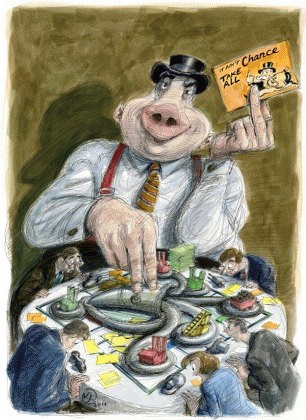Wall Street had spent much of that era arguing that America's banks needed to become bigger and badder, in order to compete globally with the German and Japanese-style financial giants, which were supposedly about to swallow up all the world's banking business. So through legislative lackeys like red-faced Republican deregulatory enthusiast Phil Gramm, bank lobbyists were pushing a new law designed to wipe out 60-plus years of bedrock financial regulation. The key was repealing -- or "modifying," as bill proponents put it -- the famed Glass-Steagall Act separating bankers and brokers, which had been passed in 1933 to prevent conflicts of interest within the finance sector that had led to the Great Depression. Now, commercial banks would be allowed to merge with investment banks and insurance companies, creating financial megafirms potentially far more powerful than had ever existed in America.
All of this was big enough news in itself. But it would take half a generation -- till now, basically -- to understand the most explosive part of the bill, which additionally legalized new forms of monopoly, allowing banks to merge with heavy industry. A tiny provision in the bill also permitted commercial banks to delve into any activity that is "complementary to a financial activity and does not pose a substantial risk to the safety or soundness of depository institutions or the financial system generally."
Complementary to a financial activity. What the hell did that mean?
"From the perspective of the banks," says Saule Omarova, a law professor at the University of North Carolina, "pretty much everything is considered complementary to a financial activity."
Fifteen years later, in fact, it now looks like Wall Street and its lawyers took the term to be a synonym for ruthless campaigns of world domination. "Nobody knew the reach it would have into the real economy," says Ohio Sen. Sherrod Brown. Now a leading voice on the Hill against the hidden provisions, Brown actually voted for Gramm-Leach-Bliley as a congressman, along with all but 72 other House members. "I bet even some of the people who were the bill's advocates had no idea."
Today, banks like Morgan Stanley, JPMorgan Chase and Goldman Sachs own oil tankers, run airports and control huge quantities of coal, natural gas, heating oil, electric power and precious metals. They likewise can now be found exerting direct control over the supply of a whole galaxy of raw materials crucial to world industry and to society in general, including everything from food products to metals like zinc, copper, tin, nickel and, most infamously thanks to a recent high-profile scandal, aluminum. And they're doing it not just here but abroad as well: In Denmark, thousands took to the streets in protest in recent weeks, vampire-squid banners in hand, when news came out that Goldman Sachs was about to buy a 19 percent stake in Dong Energy, a national electric provider. The furor inspired mass resignations of ministers from the government's ruling coalition, as the Danish public wondered how an American investment bank could possibly hold so much influence over the state energy grid.
There are more eclectic interests, too. After 9/11, we found it worrisome when foreigners started to get into the business of running ports, but there's been little controversy as banks have done the same, or even started dabbling in other activities with national-security implications -- Goldman Sachs, for instance, is apparently now in the uranium business, a piece of news that attracted few headlines.
But banks aren't just buying stuff, they're buying whole industrial processes. They're buying oil that's still in the ground, the tankers that move it across the sea, the refineries that turn it into fuel, and the pipelines that bring it to your home. Then, just for kicks, they're also betting on the timing and efficiency of these same industrial processes in the financial markets -- buying and selling oil stocks on the stock exchange, oil futures on the futures market, swaps on the swaps market, etc.
Allowing one company to control the supply of crucial physical commodities, and also trade in the financial products that might be related to those markets, is an open invitation to commit mass manipulation. It's something akin to letting casino owners who take book on NFL games during the week also coach all the teams on Sundays.
The situation has opened a Pandora's box of horrifying new corruption possibilities, but it's been hard for the public to notice, since regulators have struggled to put even the slightest dent in Wall Street's older, more familiar scams. In just the past few years we've seen an explosion of scandals -- from the multitrillion-dollar Libor saga (major international banks gaming world interest rates), to the more recent foreign-currency-exchange fiasco (many of the same banks suspected of rigging prices in the $5.3-trillion-a-day currency markets), to lesser scandals involving manipulation of interest-rate swaps, and gold and silver prices.
But those are purely financial schemes. In these new, even scarier kinds of manipulations, banks that own whole chains of physical business interests have been caught rigging prices in those industries. For instance, in just the past two years, fines in excess of $400 million have been levied against both JPMorgan Chase and Barclays for allegedly manipulating the delivery of electricity in several states, including California. In the case of Barclays, which is contesting the fine, regulators claim prices were manipulated to help the bank win financial bets it had made on those same energy markets.
(Note: You can view every article as one long page if you sign up as an Advocate Member, or higher).






